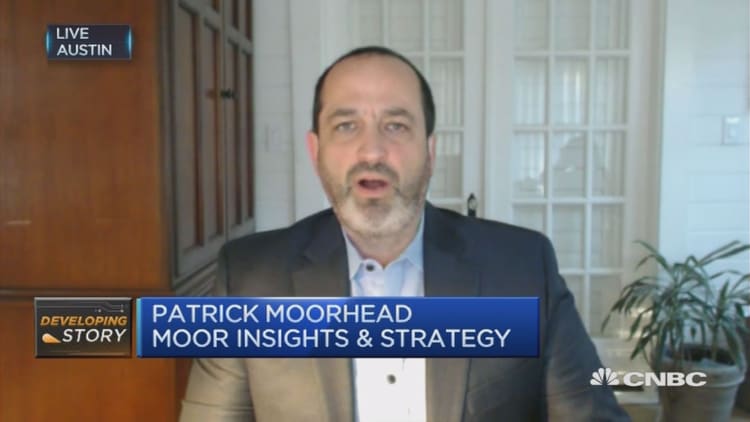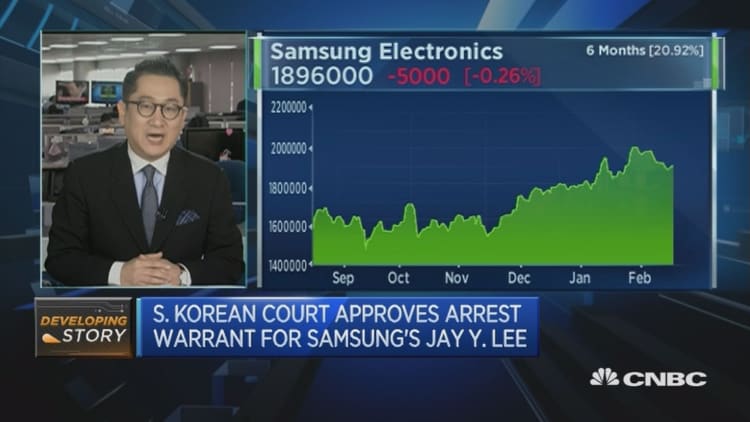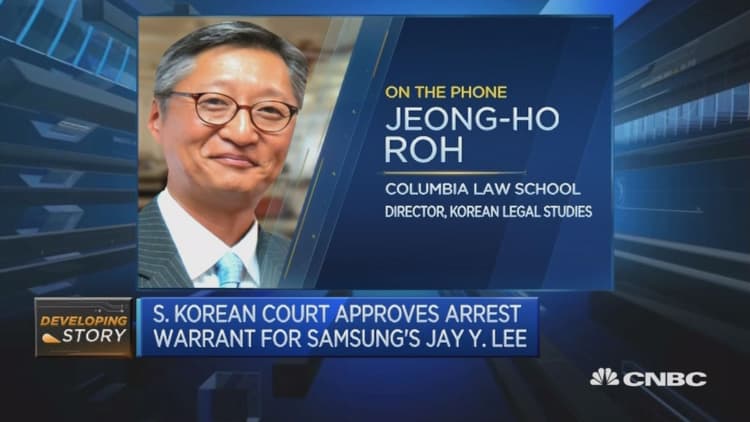The arrest of Samsung Group chief for his alleged role in a corruption scandal in South Korea is unlikely to impact the brand's global standing, analysts told CNBC on Friday.
Jay Y. Lee, the 48-year-old scion of the Lee family, was taken into custody at the Seoul Detention Centre and was being held in a single cell with a TV and desk, after waiting there overnight for the court's decision, Reuters reported.
Lee is a suspect in an ongoing investigation into an influence-peddling scandal, which led to the impeachment of President Park Geun-hye in parliament late last year.
Samsung and Lee have denied wrongdoing in the case.
In a statement after the arrest, a Samsung spokesperson said, "We will do our best to ensure that the truth is revealed in future court proceedings."
Impact on Samsung's consumer business
Patrick Moorhead, president and principal analyst at Moor Insights & Strategy, told CNBC's "Squawk Box" while there was nothing positive about the news, there was one reprieve for Samsung — Lee is not the global face of the brand.
"Mr. Lee, globally, isn't aligned with the global brand and consumers, and he's not really involved in the day-to-day activities," he said, adding Samsung followed a stovepipe organizational structure where each unit is a business itself. "I don't see any short-term impact," he said.

Indeed one of the key figures of the flagship brand — Samsung Electronics — is its chief executive, Oh-Hyun Kwon, who is navigating the smartphone giant through the aftermath of the exploding Galaxy Note 7 debacle.
Analysts said much of Samsung's key businesses were consumer-oriented — from selling smartphones to providing other tech companies with memory chips and display panels. They said the developments in South Korea will unlikely affect the purchasing decisions of global customers.
One analyst pointed to the fact that despite the Note 7 fiasco, the Samsung brand was resilient. Profits jumped 50 percent on-year in the Oct-Dec 2016 quarter.
"The semiconductor businesses are doing very well and also the LCD business is coming up," said Daniel Yoo, head of global strategy at Kiwoom Securities. He told CNBC's "Squawk Box" the handset business was an area of concern, ahead of the launch of the new flagship Galaxy S8, expected in the first half of 2017.
Recently, Samsung saw its marketshare trimmed and was overtaken by Apple for the first time in eight quarters due to the Note 7's failure.
Samsung Group shares performed mixed on Friday. Shares of Samsung Electronics closed down 0.4 percent at 1,893,000 Korean won; Samsung SDI was up 0.8 percent, Samsung Electro-Mechanics higher by 0.7 percent, while Samsung C&T dropped 2 percent and Samsung Engineering was off by 1.2 percent.

The future of 'chaebols'
Lee's arrest cast fresh light on the future of large family-run conglomerates like Samsung, which are informally known chaebols and have had close relationships with South Korea's political elite in the past.
Citizens have long demanded government policies to curtail the power of chaebols, which control vast network of companies through a circular holding structure and their control typically exceed cash-flow rights. This means families often wield undue influence over group companies in spite of small direct shareholdings.
Jeong-ho Roh, director at the Center for Korean Legal Studies at Columbia Law School, told CNBC's "Street Signs" that Lee's arrest implied that South Korea will no longer tolerate the special privileges that chaebols enjoyed under previous governments.
"From a legal perspective, he has, in the eyes of the prosecution, committed a crime, which is legally punishable. And he will be held accountable for this," said Roh. "This is the entire process we're seeing right now, that is the process of establishing the rule of law in (South) Korea."

Eurasia Group senior analyst Scott Seaman said in a note that Lee's arrest increased pressure on the Constitutional Court to also uphold Park's impeachment.
"Lee's arrest increases the risk that additional evidence will come to light that Samsung paid Park's confidante, Choi Soon-sil, in return for the government's help in securing approval for a merger in 2015 of Samsung C&T Corporation and a sister firm, Cheil Industries," Seaman wrote.
He added that a more serious and lengthy scandal around Samsung and Park's government will make chaebol reform "an even more central campaign issue in the near term." It will increase pressure on the next government to make good on pledges to rein in "chaebol excesses," according to Seaman.
— CNBC's Nyshka Chandran contributed to this report.


